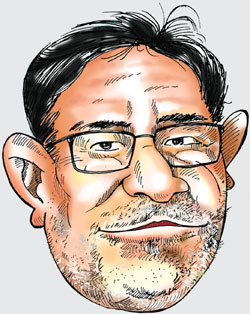 You've come a long way from two rifles and a pistol. Would things be different if the parties had done right by the people?
You've come a long way from two rifles and a pistol. Would things be different if the parties had done right by the people?
No, there are other countries where political parties are corrupt too. Why isn't there a revolution in those countries?
Could we say the political parties and the palace gathered the tinder and straw, and you just lit the spark?
I wouldn't say that, it's unscientific. There was a basis for a revolution, our ideology.
Did you think you'd succeed as much in ten years?
We knew the revolution would pick up speed, and we'd either fail or succeed very quickly. But we couldn't predict reaching this state in ten years.
Your revolution has shaken the nation, even the world, but what about all the bloodshed and lives lost?
Every great nation has been formed through great sacrifice. No nation can go forward without it.
What your heart says is more important?
I don't think your question is right. This success is not mine. It is the Nepali people who were oppressed for hundreds of years who have succeeded.
Which side is weightier, the nation's success or the loss of lives?
We are definitely saddened by the tears and blood. I am a very sensitive person. I'm not just talking about our comrades, I was equally sentimental when policemen and soldiers from the enemy camp died in large numbers.
So you do have guilt?
Let's not call it guilt. I always wanted to minimise human losses. That's why we started peace talks the first time. It wasn't necessary then, it was my sensitivity to the people's wishes. Gyanendra staged his coup last year; he's from a class that doesn't care how many Nepalis die and perhaps he as a man is a bit cruel. People wouldn't have believed in the seven party protests then. I thought deeply for three days, sleeping very little, and came to the conclusion that a ceasefire must be declared. I wasn't under any pressure from the party or from outside. The decision was purely from the soul. We decided that, as a party fighting for the working class, we must take the first step. I felt great satisfaction after the decision, and that the ceasefire became a bigger weapon than the war itself.
Why did you torture those found guilty of committing crimes?
That was a mistake, against party policy. In war it is necessary to take action against those directly involved in killing our comrades and the people. But since the people's war started, we have party central office directives, which I myself drafted, that if it is necessary to annihilate anyone, there must be no torture. But it did happen anyway. There were some pictures of people our friends killed that I couldn't even look at. I myself was terrorised when I saw these pictures.
What action did you take against your party members found guilty of committing these barbaric murders?
I can't give you details now, but we took very serious action. Otherwise the movement would have lost its base.
We hear the political parties suggested you use your weapons during the April Jana Andolan.
When Gyanendra was trying to hold his local level elections the seven parties requested that we mobilise our PLA to attack and make the elections a failure.
Now we don't know what kind of pressure the parties are under, maybe from foreign powers. Because of the five-point agreement, we felt secure, but within two or three days Girija Babu went to Biratnagar and said repeatedly at press conferences that the Maoists can't be considered a political party until we give up our weapons. He shouldn't have. He also kept talking about a ceremonial monarchy, which he needn't have done, whatever his own beliefs. At the time we were holding talks and the interim constitution was being prepared. His comments only roused unnecessary suspicion.
Third, the most important and sensitive issue for Nepal at this moment is the democratisation of the army, yet he rewarded the old regime by making Rukmangat Katuwal chief and confirmed our suspicions. In Kamidanda we said that unless the government is pressured by the street, it is going to regress.
So Girija Prasad's words and actions made you decide that they must be attacked?
Attack is not the right word, but the conclusion was that unless the people were brought on the streets once again, the government would turn back. Girija Prasad Koirala is the prime minister of a country in a state of emergency. Whatever he says cannot be taken as a personal statement. Girija is not an individual at this moment.


